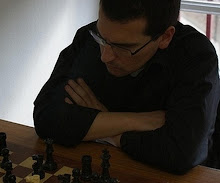 Kemen, 1937.
Kemen, 1937. Fila da frente, da esquerda para a direita:
Vladimirs Petrovs, F. Apscheneek, A. Melnbārdis, K. Bētiņš, H. Kmoch, S. Landau, S. Flohr, P. Keres, E. Steiner.
Behind: J. Kalniņš, E. Giese, P. Ķeirans, V. Mikenas, M. Feigins, K. Ozols, L. Rellstab, E. Böök, S. Tartakower, A. Kanenbergs, A. Alekhine, G. Ståhlberg.
Publico, o texto original, em inglês.
Mais xadrezistas, ficarão a saber quem era este eminente xadrezista e em traços gerais o que lhe passou durante a contorbada época do criminoso regime estalinista.
"Vladimirs Petrovs or Vladimir Petrov (born 27 September 1907 at Riga – died 26 August 1943 at Kotlas) was a Latvian chess master.
Learning the game relatively late, at age 13, Vladimirs Petrovs made rapid progress. By 1926, at age 19, he had improved enough to win the Riga Championship and finish 3rd in the national championship. He placed 2nd–5th, behind Isakas Vistaneckis, in the first Baltic Championship 1931 at Klaipeda. In 1931 Petrovs won a match with Movsas Feigins (+4 –1 =3), in 1932 he won a match with Vladas Mikenas (+2 –0 =1), and in 1934 narrowly lost a match to Rudolf Spielmann (+1 –2 =5).
Vladimirs Petrovs tied for 1st with Fricis Apsenieks in 1934, and won in 1935 and 1937 in Latvian championships. He won at Helsinki 1936, and was equal first with Samuel Reshevsky and Salo Flohr at Kemeri 1937, ahead of Alexander Alekhine, Paul Keres, Endre Steiner, Saviely Tartakower, Reuben Fine, Gideon Stahlberg and others. This was Petrovs’ finest tournament achievement. In the same year he unfortunately was 8th (the last one) at Semmering. Petrovs placed 3rd-5th at Łódź 1938 behind Vasja Pirc and Saviely Tartakower, and third at Margate 1938, behind Alexander Alekhine and Rudolf Spielmann, but beats Alekhine in their individual game. In 1939 Petrovs placed 8th of 16 at Kemeri–Riga, and won at Rosario, ahead of Erich Eliskases and Vladas Mikenas.
Vladimirs Petrovs played for Latvia in all seven official Chess Olympiads in 1928–1939. He also played at the unofficial Olympiad at Munich 1936.
In July/August 1928, he played at third board at the 2nd Olympiad in The Hague (+5 –4 =7).
In July 1930, he played at second board at the 3rd Olympiad in Hamburg (+8 –3 =6).
In July 1931, he played at third board at the 4th Olympiad in Prague (+9 –2 =5).
In July 1933, he played at second board at the 5th Olympiad in Folkestone (+6 –5 =3).
In August 1935, he played at first board at the 6th Olympiad in Warsaw (+7 –5 =7).
In August/September 1936, he played at first board at the unofficial Olympiad in Munich (+10 –3 =7).
In July/August 1937, he played at first board at the 7th Olympiad in Stockholm (+5 –3 =10).
In August/September 1939, he played at first board at the 8th Olympiad in Buenos Aires (+8 –0 =11).[1]
He won two individual medals: gold in 1931 and bronze in 1939.
He achieved a particularly brilliant result playing on top board at Buenos Aires: he lost not a single game, drew against world champion Alexander Alekhine, former world champion José Raúl Capablanca, and the young superstar Paul Keres, and won against Vladas Mikenas, Roberto Grau, Saviely Tartakower, and Moshe Czerniak.
In 1940 the Soviet Union annexed Latvia. Petrovs was critical but played under the new regime, placing 10th of 20 in the 1940 USSR Championship, taking equal third at Riga 1941, and second in several strong tournaments: Moscow 1941, behind Isaak Mazel, Moscow 1942, behind Isaac Boleslavsky, and Sverdlovsk 1942, behind Viacheslav Ragozin.
When Nazi Germany invaded the Soviet Union on the 22 June 1941, Petrovs was unable to return to his wife and daughter at home in Latvia.
He therefore remained in Russia, and was arrested on the 31st of August 1942 under the infamous Article 58, for criticising decreased living standards in Latvia since the Soviet annexation of 1940. Petrovs was sentenced to ten years in a corrective labor camp.
His final fate was revealed in 1989 when it became known that he had died at Kotlas on August 26, 1943 from an inflammation of the lungs.">>>






























